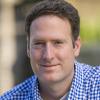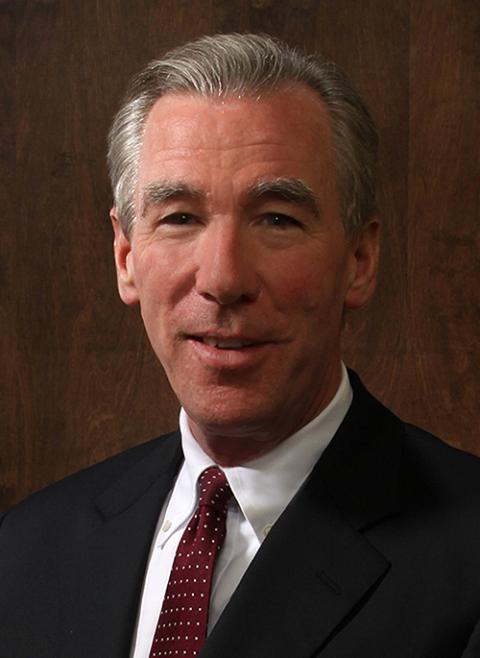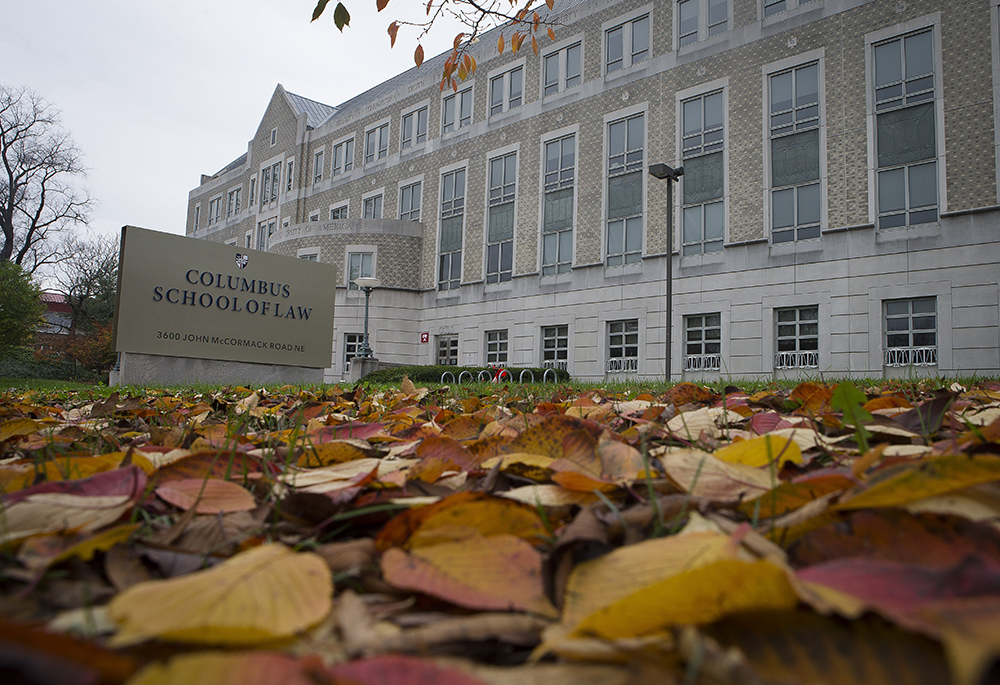
The Catholic University of America's Columbus School of Law in Washington is seen Nov. 13, 2020. Leonard Leo directed a $4.25 million gift from an anonymous donor last spring to establish the Project on Constitutional Originalism and the Catholic Intellectual Tradition at the law school. (CNS/Tyler Orsburn)
During a June gathering inside a century-old gothic building at the Catholic University of America, mingling among the crowd gathered to say farewell to departing president John Garvey was one of the most powerful men in Washington.
Leonard Leo, the chief adviser to Donald Trump on Supreme Court nominations, listened as one of those picks he helped secure on the bench, Amy Coney Barrett, delivered remarks praising Garvey, her longtime mentor and former law professor at the University of Notre Dame. Leo and Barrett's presence together that night reflects the rising influence of conservative Catholics on the law at a time when the Supreme Court's rightward transformation is reconfiguring American jurisprudence on issues of abortion, voting rights and religious liberty.
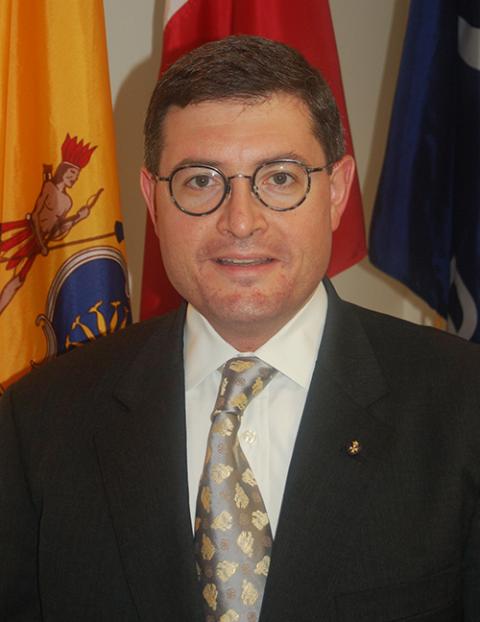
Leonard Leo, pictured in an undated photo (CNS/Courtesy of the Federalist Society)
The co-chairman of the Federalist Society — an influential conservative legal network that celebrated its 40th anniversary in November — Leo has also emerged as a major player at Catholic University, the nation's only Vatican-chartered university.
In the last few years, he has helped raise more than $20 million for the school, primarily through anonymous donations. Leo directed a $4.25 million gift from an anonymous donor last spring to establish the Project on Constitutional Originalism and the Catholic Intellectual Tradition at Catholic University's Columbus School of Law. Supreme Court Justice Samuel Alito delivered the initiative's inaugural lecture in September. Leo also helped facilitate another $4 million in funding from an anonymous donor at the end of August to establish an endowed chair for the project in partnership with the Knights of Columbus, according to an article in the Fall 2022 issue of the school's alumni magazine.
In addition to the law school funding, Leo brokered a $13 million donation from an anonymous donor in 2019 for the university's Institute on Human Ecology and the Busch School of Business, where he sits on the board of visitors. The business school, which has received more than $10 million from the Charles Koch Foundation in recent years, is known for its libertarian-inflected economics and events that have featured Sen. Marco Rubio of Florida. Koch is a billionaire industrialist and longtime Republican donor who has used part of his fortune to fight policies that address climate change.
Timothy Busch, a Catholic attorney from Orange County, California, who gave $15 million to Catholic University in 2016, the largest donation in school history, pointed to Leo's role in shepherding the nominations of Neil Gorsuch, Brett Kavanaugh and Amy Coney Barrett as a driving factor in the court's Dobbs v. Jackson Women's Health Organization decision that overturned more than 40 years of precedent on abortion rights.
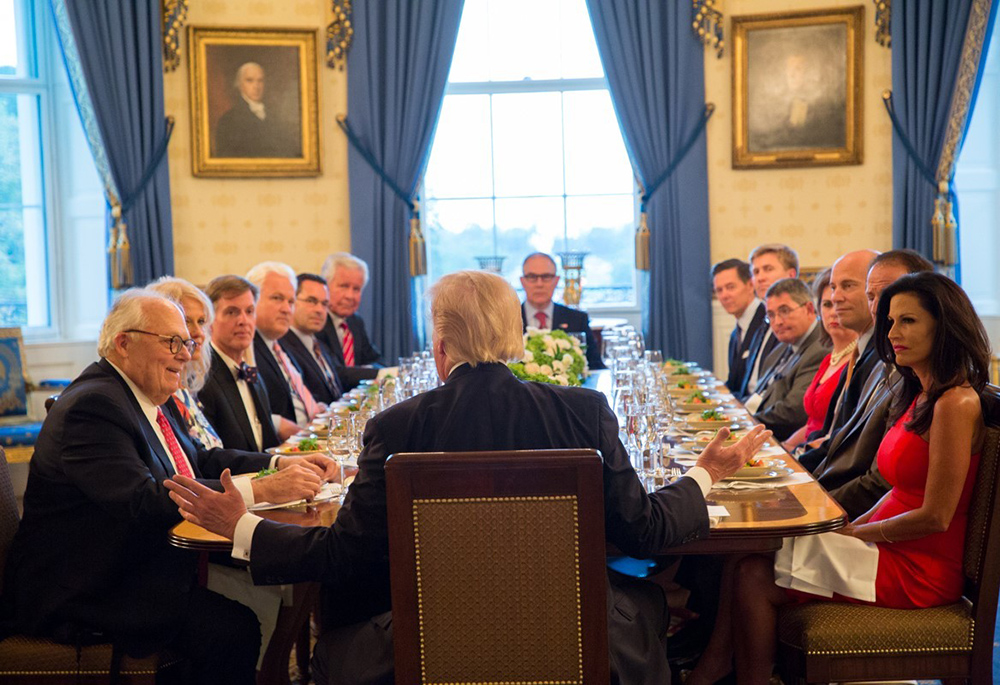
Leonard Leo (fifth from the front, on the right) attends a dinner for grassroots leaders hosted by then-President Donald Trump in the Blue Room at the White House Sept. 25, 2017, in Washington. (Wikimedia Commons/Official White House photos/Shealah Craighead)
"This is why we have the court we have today and the court America deserves," Busch said about Leo in July to the Union of Catholic Asian News.
Leo is a donor to Busch's Napa Institute, a conservative Catholic organization known for its high-priced summer conference. Busch and Napa's forays into funding at the University of Notre Dame has sparked opposition from some faculty at the university, who publicly shared their concerns with NCR last year after Busch denounced the Black Lives Matter movement for "promoting racism" and the conference included speaker L. Brent Bozell III, who signed a letter declaring Donald Trump to be "the lawful winner of the presidential election."
Last week, (Dec. 5) Napa posted a picture of Leo, Busch and Archbishop Timothy Broglio, the recently elected president of the U.S. bishops' conference, dining at a restaurant together in Washington. Others attending the dinner included Dominican Fr. Aquinas Guilbeau, chaplain and director of campus ministry at Catholic University, and Dominican Fr. Dominic Legge, director of the Thomistic Institute and assistant professor of theology at the Pontifical Faculty of the Immaculate Conception in Washington.
Concerns about fundraising
Leo's ability to wield influence at Catholic University is not limited to his fundraising prowess. He also chairs the academic affairs committee of the board of trustees. According to the board’s bylaws, Leo's committee is responsible for providing oversight of faculty and academic programs, along with recommending tenure for approval by the board of trustees.
The confluence of Leo's fundraising and his key position on the board, along with the flood of Koch money at the university in recent years, has raised concerns among some current and former faculty and board members.
"This whole crowd thinks of the church in terms of American politics and they really think they can buy the church and academic institutions with their money," said a Catholic University professor who spoke on the condition of anonymity.
Former president Garvey, a Federalist Society member who has long traveled in Leo's circles, made an intentional effort to cultivate conservative donors, the faculty member noted, and invited Leo to join the board.
"There is nothing wrong with conservatism at a university. It's the ideology that often comes with it that can be problematic at a Catholic university," the professor said.
When significant amounts of money come from anonymous donors, the professor said, it raises questions about whether faculty hires and leaders of academic institutes have been chosen in part for their political and ideological leanings.
"At a public university at least you have more transparency and there can be freedom of information requests made," the professor added. "We don't have that here. Faculty are always trying to figure out what is going on. If you don't know where the money is coming from and what the conditions are with these donor agreements, then you just have to trust the administration."
Stephen Schneck, who spent more than three decades at Catholic University as a professor, department chair and dean before retiring in 2017, noted that the surge in right-wing funding at the school is at least partly a product of practical pressures.
"The financial situation at the university was such that it needed funding from whatever source could provide it," Schneck said. "At the same time, politically conservative leaders at the university were eager to fund new programs that reflected their vision. And politically conservative foundations had strategic plans to promote their values and ideologies at targeted universities. Those who argue that funding came with no strings attached are closing their eyes to what happened at Catholic [University]."
Mark Tuohey, a former member of Catholic University's board for 12 years, described Leo as a "good choice for the board" and a "credible voice" for conservative positions.
"He is straightforward in expressing his views," said Touhey, a corporate attorney at the Washington firm BakerHostetler whose board tenure ended in 2016. "He has an engaging personality and people like him even if they disagree with him."
Touhey called Leo a "force" in the conservative wing of the church and said that the university board should have a diverse mix of views. "I think that balance has shifted toward a more conservative point of view at Catholic over the last 10 years," he said. "I think it needs to be more balanced."
The Federalist Society did not respond to a request to interview Leo for this article.
Advertisement
A cautionary tale
Leo also has been involved with ideologically motivated fundraising at George Mason University in Fairfax, Virginia, as reported by several news outlets. In 2016, Mason announced a $30 million donation to its law school, which included $10 million from the Charles Koch Foundation and a $20 million gift from an anonymous donor facilitated by Leo. The anonymous donor's gift came with the stipulation that the law school be renamed after the late Supreme Court Justice Antonin Scalia, a close ally of Leo since their early days in the Federalist Society.
In response to public record requests filed by an alumna of the law school, the administration of the donor money was traced back to the BH Fund, a company Leo helped lead. E-mail exchanges between the law school dean and Leo, disclosed after public record requests from student activists at George Mason and the activist group UnKoch My Campus, show Leo and the dean sharing detailed information about faculty hiring, judicial law clerk suggestions, allocations of the gift money and communications about faculty taking leave to work in the Trump administration.
George Mason University president Ángel Cabrera, who left the school in 2019, emailed university employees to acknowledge that the exchanges revealed "problematic gift agreements" that "fall short of the standards of academic independence."
Bethany Letiecq, an associate professor at George Mason University, told NCR that the influence of Leo and Koch at her university could be a "cautionary tale" for Catholic University.
"We really saw how undue donor influence transformed our campus, especially in the law school and economics department," Letiecq said. "They had a strategy to start these centers and schools that were part of an effort to capture the university for their own political agenda. The faculty was rolled over and had so little power."
Catholic University's law school dean, Stephen Payne, did not respond to several requests for an interview. Payne was an adjunct professor at George Mason University's law school and currently serves on the board of the Napa Legal Institute with Leo. Leo and Payne are both graduates of Cornell University.
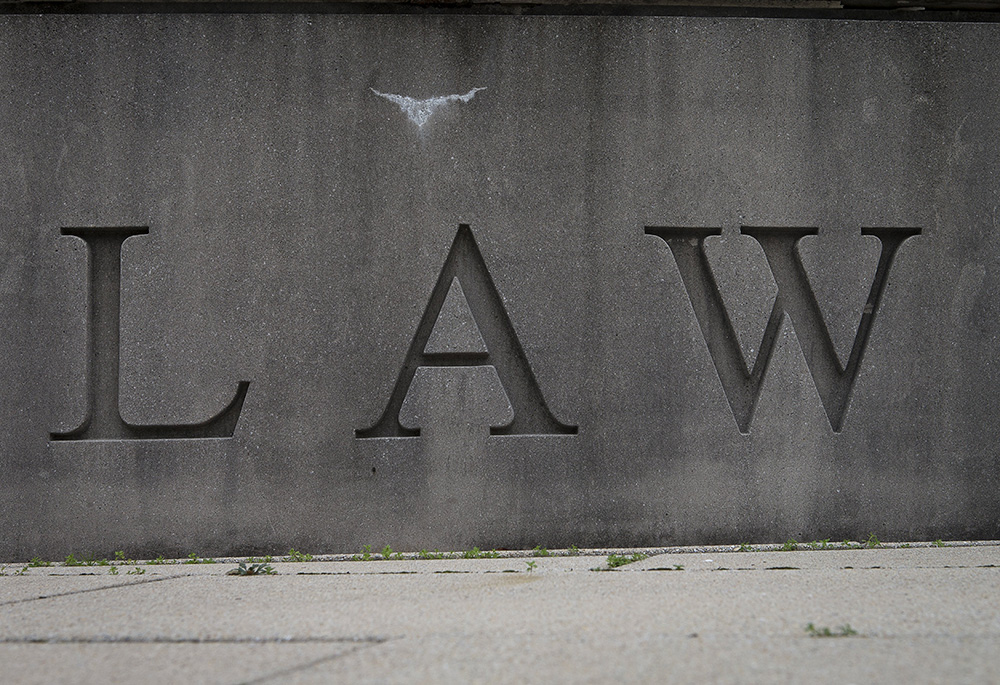
Signage is seen on the Catholic University of America's Columbus School of Law building in Washington. Associate Justice Samuel Alito gave the inaugural lecture for the Project on Constitutional Originalism and the Catholic Intellectual Tradition, a new program housed within the law school. (CNS/Tyler Orsburn)
In a Catholic University video highlighting donors to the university, Leo said the law school’s Project on Constitutional Originalism and the Catholic Intellectual Tradition will "foster within the broader citizenry a greater appreciation for the way in which those structural limits on government power contained in our constitution really protect and preserve the dignity and worth of the human person."
In response to questions about Leo's role at Catholic University, Daniel Drummond, the associate vice president of communications, said in an email that "every single person on the Board is dedicated to the mission of the university and their service is central to its future as a research institution steeped in the Catholic tradition of education." While the university "welcomes donations and support from many different people, companies, and organizations," he added, "this support is not connected to any university policy making decisions, including hiring or tenure decisions."
Leo's fundraising prowess is prolific. In August, The New York Times reported that one of Leo’s nonprofit advocacy organizations, Marble Freedom Trust, received a staggering $1.6 billion donation from Barre Seid, an electronics manufacturing mogul. The trust is a so-called dark money group that is not required to disclose its donors. Marble can spend directly on elections as well as funding issue-advocacy groups, think tanks, religious institutions and organizing campaigns. The investigative news outlet ProPublica described the gift as the "largest known donation to a political advocacy group in U.S. history."
Leo is also connected in varying capacities to a sprawling network of political advocacy groups that have spent nearly $504 million dollars from 2015 to this year. Part of this advocacy is focused on voting issues.
"In February, 2020, the Judicial Education Project, a group tied to Leo, quietly rebranded itself as the Honest Elections Project, which subsequently filed briefs at the Supreme Court, and in numerous states, opposing mail-in ballots and other reforms that have made it easier for people to vote," the investigative reporter Jane Mayer wrote last year in a New Yorker article, "The Big Money Behind the Big Lie."
The Honest Elections Project has advocated for a controversial legal theory in a case now before the U.S. Supreme Court that claims the U.S Constitution gives state legislatures nearly unchecked power over how federal elections are run. Voting rights advocates warn it could help state lawmakers upend future presidential elections.
A group Leo founded, The 85 Fund, also gave $250,000 to Students for Fair Admissions, the nonprofit arguing for an end to affirmative action policies at Harvard University and the University of North Carolina in a case now before the U.S. Supreme Court.
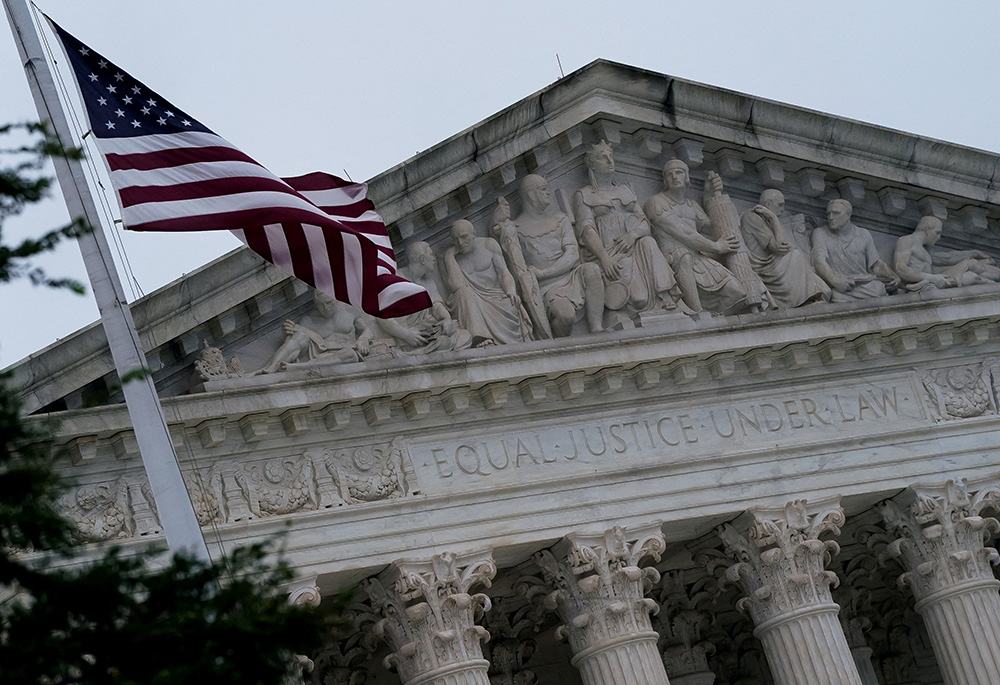
The U.S. Supreme Court building is seen Oct. 2 in Washington. (CNS/Reuters/Elizabeth Frantz)
Motivated by faith
At 56, Leo has long been a fixture in the overlapping cultures of Republican politics and conservative Catholicism in Washington.
In October, the Opus Dei-affiliated Catholic Information Center — a K Street hub that describes itself on its website as "the closest tabernacle to the White House" — gave Leo a John Paul II New Evangelization Award, honoring him as a "champion of the rule of law, advocate of global religious freedom, and committed leader of many Catholic organizations in Washington, D.C. and around the country." Leo sits on the center's board.
The awards dinner at the Mayflower Hotel was closed to the press. The center did not respond to several requests from NCR to comment for this article.
In a video of his speech released by the Catholic Information Center a month after the award’s dinner, Leo described the work of Catholic evangelization as involving "every facet of life, including law, public policy and politics, which are the areas that I know best." He warned that this evangelization "faces extraordinary threats and hurdles" because "our culture is more hateful and intolerant of Catholicism than at any other point in our lives. It despises who we are, what we profess, and how we act."
"Catholicism faces vile and immoral current-day barbarians, secularists and bigots," Leo said. "These barbarians can be known by their signs. They vandalized and burned our churches after the Supreme Court overturned Roe v. Wade. They show up at events like this one, trying to frighten and muzzle us. From coast to coast they are conducting a coordinated and large-scale campaign to drive us from the communities they want to dominate. … Our opponents are not just uninformed or unchurched. They are often deeply wounded people whom the devil can easily take advantage of."
"I can't think of anyone who has lived his faith more powerfully than Leonard Leo," former Attorney General William Barr, a past board member at the Catholic Information Center, said in a video tribute produced by the organization. "He does it quietly and unassumingly but with inhuman energy. … It's particularly fitting that the very year in which Dobbs was decided we are honoring Leonard Leo because no one has done more to advance traditional values, and especially the right to life, than Leonard."
But John Sniegocki, a professor of theology at Xavier University in Cincinnati, called the decision to honor Leo with an award named for the late pope "deeply concerning."
"Many of the projects that Leo has been involved with support goals that run directly counter to the teachings of John Paul II," he told NCR. "These projects have worked to undermine voting rights, hinder action on climate change and foster deregulation of corporate activities, whereas John Paul II called for the expansion of democracy, spoke of climate change as one of the most pressing ethical issues facing the modern world and supported strong regulation on behalf of the common good. The granting of this award appears to be another attempt by certain segments of the Catholic Church in the United States to hijack the name and reputation of Pope John Paul II to support a political agenda that runs deeply contrary to the actual teachings of John Paul II and the broader tradition of Catholic social teaching."
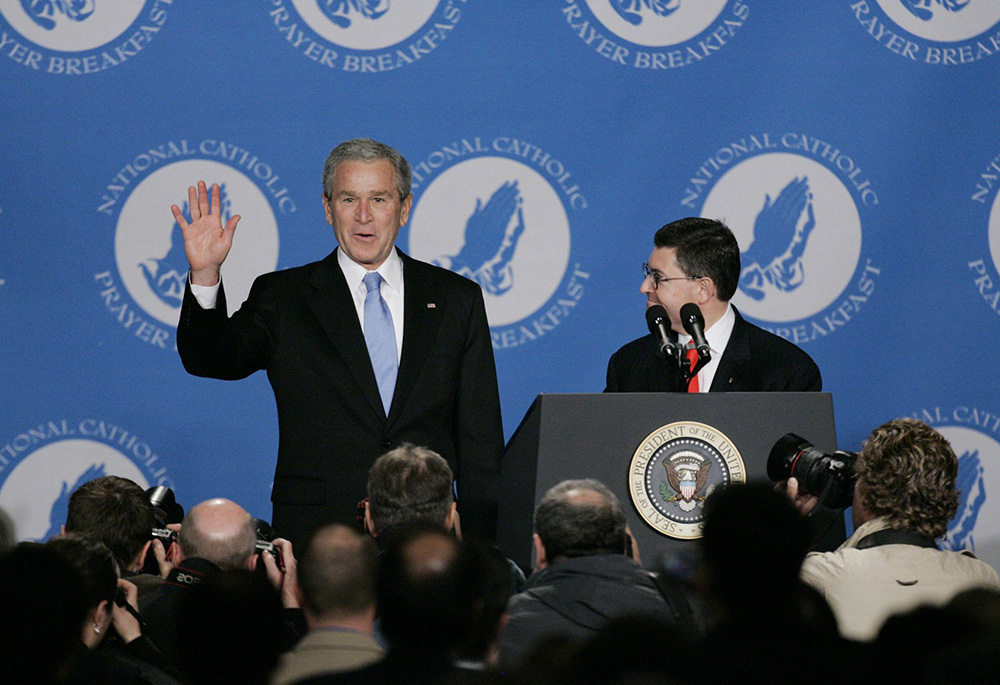
Then-President George W. Bush waves as he arrives at the fourth annual National Catholic Prayer Breakfast April 13, 2007, in Washington. The president was introduced by Leonard Leo, right, then-executive vice president of the Federalist Society for Law and Public Policy Studies. (CNS/Paul Haring)
A Catholic strategist for George W. Bush's 2004 presidential campaign, Leo was a founding board member of the National Catholic Prayer Breakfast, an annual event that has become an important destination for Republican presidents, conservative bishops and well-connected Catholics in the nation's capital. Leo is also a member of the Knights of Malta, a lay religious order of the Catholic Church dating back to the 12th century. President George W. Bush appointed him to the U.S. Commission for International Religious Freedom in 2007, and Leo later served as chairman.
"As government policy becomes more grudging toward religious freedom, that attitude spreads in the broader culture," Leo said in a 2017 speech accepting an award from Becket, a leading religious liberty institute whose lawyers have argued cases before the Supreme Court. "A hostile stance in Washington creates space for groups with kindred ideological designs. We see this in the coercive tactics and nasty rhetoric directed against companies known for their religious and moral standards."
Leo and former Catholic University president John Garvey serve together on Becket’s board.
At Cornell Law School, Leo founded a student chapter of the Federalist Society, then moved to Washington in 1991 to work for the organization. He is the father of seven children. Leo's first child Margaret, who died of spina bifida, deepened his Catholic faith and encouraged him to attend daily Mass, according to a 2017 profile in The New Yorker.
Supreme Court Justice Clarence Thomas, who once remarked during a live event that Leo was "the No. 3 most powerful person in the world," still keeps drawings from Leo's daughter under glass on his desk.
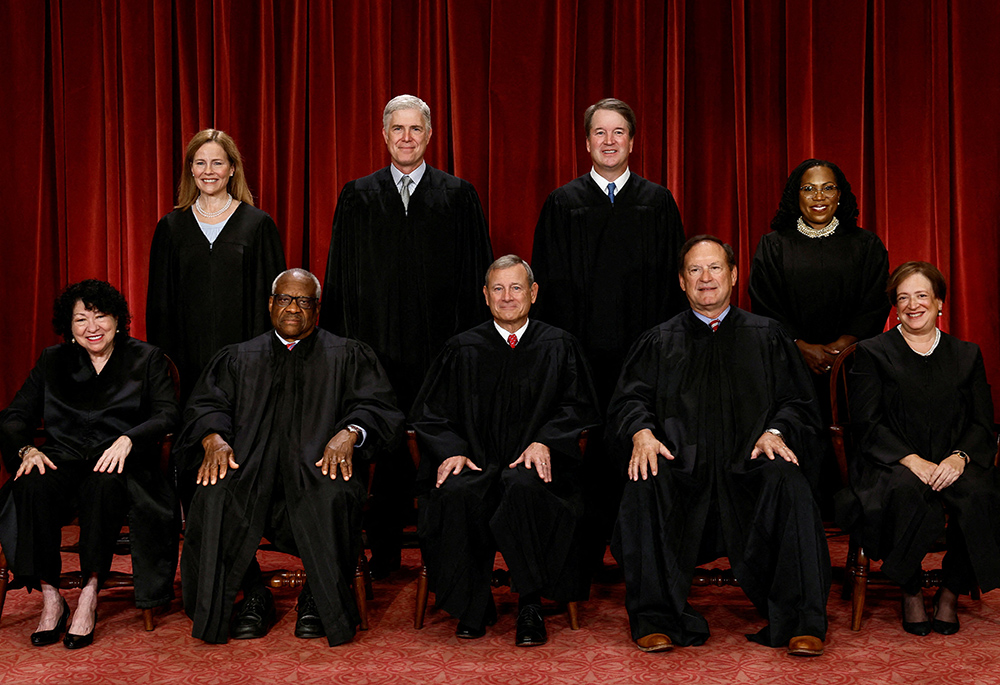
U.S. Supreme Court justices pose for their group portrait at the Supreme Court Oct. 7 in Washington. Seated from left are Justices Sonia Sotomayor and Clarence Thomas, Chief Justice of the United States John Roberts Jr., and Justices Samuel Alito Jr. and Elena Kagan. Standing from left are Justices Amy Coney Barrett, Neil Gorsuch, Brett Kavanaugh and Ketanji Brown Jackson. (CNS/Reuters/Evelyn Hockstein)
Robert George, a Princeton University professor and prominent Catholic conservative, first met Leo in the early 1990s when George received an award from the Federalist Society as a promising legal scholar under the age of 40.
"We had a conversation about law and judicial politics in which I was impressed by his depth of understanding and his vision of the role of the Federalist Society," recalled George, who serves on the board of the Ethics and Public Policy Center in Washington with Leo. The two men, who are both serious wine collectors, grew closer over the years as their shared interest in law, politics and religion fueled conversations and professional collaborations. Leo and George teamed up to help put together an interfaith conference on marriage at the Vatican in 2014. At Leo's urging, George accepted an appointment to the U.S. Commission on International Religious Freedom, and George was later tasked with leading the commission.
"Leonard is a person of deep faith," George told NCR. "He reads and thinks about the great religious questions and matters of theology. This deep faith moves and sustains him. It gives him strength when he comes under political attack or draws ideological fire."
"The key to Leonard's success in shaping and, in truth, building the modern conservative legal movement," George added, "is that he does not seek the limelight or worry about who gets credit for the movement's achievements or victories. It goes without saying that he is exceptionally smart and savvy."
Richard Garnett, a University of Notre Dame law professor, described Leo as a lay Catholic who engages "conscientiously and thoughtfully in the public life in our constitutional democracy, as the church's modern social teachings urge us to do."
"Contrary to press coverage and commentary painting his activities as somehow suspect or nefarious, his work — whether one agrees with his policy positions and goals or not — is no different from the efforts of countless other engaged citizens and political activists," Garnett told NCR. "In particular, he contributed substantially to the decades-long effort to develop a method of judicial interpretation, and to train lawyers in that method, which, this past summer, resulted in the abandonment of the Court's misguided decision in Roe v. Wade."
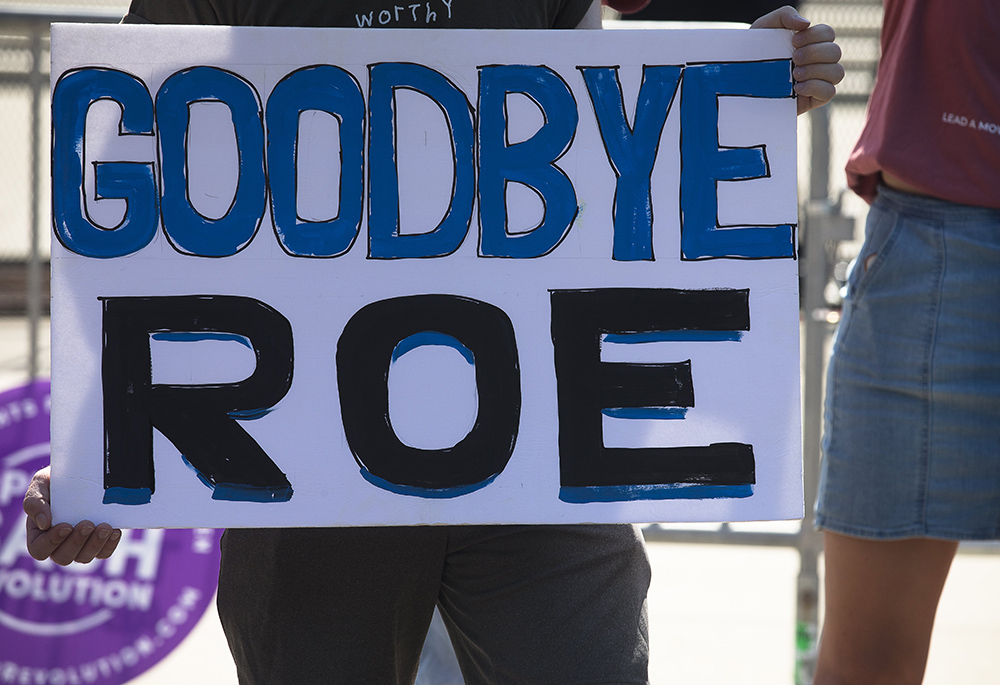
Pro-life demonstrators are seen near the Supreme Court June 15 in Washington. (CNS/Tyler Orsburn)
'The long game'
Leo's three-decade effort to build the Federalist Society into a powerful pipeline for conservative legal talent and his influence on shaping law schools is part of a broader organizing effort on the right.
"Leonard Leo is fully integrated within a political infrastructure that seeks to radically transform the laws, the lawyers that litigate them, and the judges that interpret them," said Isaac Kamola, an associate professor of political science at Trinity College in Hartford, Connecticut, and author of Free Speech and Koch Money: Manufacturing a Campus Culture War.
"Leo and the Koch network know that political ideas get legitimized in higher education so they have a sophisticated funding strategy for creating academic centers, influencing law schools and producing these ideologies and legal theories that are then used to justify policies like deregulation of corporations and denying climate science."
In a 2020 speech at the Manhattan Institute, Leo explained the Federalist Society's impact promoting originalist interpretations of the Constitution — a philosophy of judicial interpretation shared by several of the conservative justices on the Supreme Court. "We have built the infrastructure on the law school campus and in the legal culture generally to revive the ideal of limited constitutional government," he said. "The ideas that were for sometime far outside the legal mainstream — ideas like originalism, textualism, and judicial enforcement of the separation of powers — are now on the cusp of becoming the legal mainstream."
Cathleen Kaveny, a Boston College scholar who is an expert on the relationship between law and religion, said Leo uses the Federalist Society to build a "coherent movement that stands for a certain view of constitutional interpretation that wants to enshrine conservative Christian values."
But she argues that wasn't the intent of the founders and doesn't align with a traditionally Catholic understanding of law and politics.
"It's an approach that is far more evangelical and fundamentalist than Catholic," Kaveny said. "If Catholics approached the Bible the way these originalists view the Constitution, we would be fundamentalists."
A former law professor at the University of Notre Dame, Kaveny watched as the school transformed and she glimpses a potential similar effort at Catholic University with Leo's influence.
"At Notre Dame Law School, they narrowed the notion of Catholic hiring to mean hiring a certain kind of Catholic who is committed to the culture wars," Kaveny said. "They hired very committed and talented people, and the money followed. It took 30 years, but they played the long game. And it was successful."
